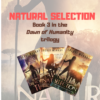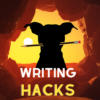Category: Teacher-author
Teacher-Authors–Help launch my latest prehistoric fiction
If you’re a teacher-author–like me!–I’d love your help launching this HS-level historical fiction book with your community. In return, I’d be more than happy to share yours with mine!

The world has changed. Can Lucy, too, if it will save her tribe?
In this conclusion to Lucy’s journey, she and her tribe leave their good home to rescue former tribemembers captured by the enemy. Lucy’s tribe includes a mix of species–a Canis, a Homotherium, and different iterations of early man. More join and some die, but that is the nature of prehistoric life, where survival depends on a combination of developing intellect and man’s inexhaustible will to live. Based on true events.
If you’d like to know a little more about Natural Selection, here’s the trailer.
[youtube https://www.youtube.com/watch?v=jZhlvou9hvg]
An Indie author’s most powerful marketing tool is word of mouth. We don’t have a big publisher behind us or an agent that pushes us out to the world. What we have is each other, telling our friends about the latest great book we’ve read.
I need your help
If you’re willing to help me promote my latest book, I’ll help you! Here’s how it works:
Share this:
- Click to share on Facebook (Opens in new window) Facebook
- Click to share on X (Opens in new window) X
- Click to share on LinkedIn (Opens in new window) LinkedIn
- Click to share on Pinterest (Opens in new window) Pinterest
- Click to share on Telegram (Opens in new window) Telegram
- Click to email a link to a friend (Opens in new window) Email
- More
Teacher-Authors: What’s Happening on my Writer’s Blog
A lot of teacher-authors read my WordDreams blog. In this monthly column, I share one of the most popular posts from the past month on my writer’s blog, WordDreams.
 Tech Tips for Writers is an occasional post on overcoming Tech Dread. I’ll cover issues that friends, both real-time and virtual, have shared. Feel free to post a comment about a question you have. I’ll cover it in a future tip.
Tech Tips for Writers is an occasional post on overcoming Tech Dread. I’ll cover issues that friends, both real-time and virtual, have shared. Feel free to post a comment about a question you have. I’ll cover it in a future tip.
This tip is about visiting a website that gives you an error code similar to this:

You probably think the site isn’t working, but a lot of times, it’s a different easily solved problem that takes no time to do.
Look at the URL address (at the top of the webpage):
Share this:
- Click to share on Facebook (Opens in new window) Facebook
- Click to share on X (Opens in new window) X
- Click to share on LinkedIn (Opens in new window) LinkedIn
- Click to share on Pinterest (Opens in new window) Pinterest
- Click to share on Telegram (Opens in new window) Telegram
- Click to email a link to a friend (Opens in new window) Email
- More
Teacher-Authors: What’s Happening on my Writer’s Blog
A lot of teacher-authors read my WordDreams blog. In this monthly column, I share a popular post from the past month (or so).
***
 Tech Tips for Writers is an occasional post on overcoming Tech Dread. I’ll cover issues that friends, both real-time and virtual, have shared. Feel free to post a comment about a question you have. I’ll cover it in a future tip.
Tech Tips for Writers is an occasional post on overcoming Tech Dread. I’ll cover issues that friends, both real-time and virtual, have shared. Feel free to post a comment about a question you have. I’ll cover it in a future tip.
This tip is about visiting a website that gives you an error code similar to this:

You probably think the site isn’t working, but a lot of times, it’s a different easily solved problem that takes no time to do.
Look at the URL address (at the top of the webpage):

If it has https (like this one does), it could mean the website hasn’t been changed from http to https so it doesn’t recognize the address. All you have to do is delete the ‘s’ in the URL to make the site work:

I blurred everything out for privacy, but I think you can see I changed the https to http. The site immediately opened. Interestingly, that works over half the time.
If a site you manage has that problem, check with your host or IT folks and upgrade to https security protocol. Often, that’s free.
Jacqui Murray is the author of the popular Man vs. Nature saga, the Rowe-Delamagente thrillers, and the acclaimed Building a Midshipman, the story of her daughter’s journey from high school to United States Naval Academy. She is also the author/editor of over a hundred books on integrating tech into education, adjunct professor of technology in education, blog webmaster, an Amazon Vine Voice, and a freelance journalist on tech ed topics. Look for her next prehistoric fiction, Natural Selection, Summer 2022
Share this:
- Click to share on Facebook (Opens in new window) Facebook
- Click to share on X (Opens in new window) X
- Click to share on LinkedIn (Opens in new window) LinkedIn
- Click to share on Pinterest (Opens in new window) Pinterest
- Click to share on Telegram (Opens in new window) Telegram
- Click to email a link to a friend (Opens in new window) Email
- More
Teacher-Authors: What’s Happening on my Writer’s Blog
A lot of teacher-authors read my WordDreams blog. In this monthly column, I share the most popular post from the past month on that blog:
***
 Tech Tips for Writers is an occasional post on overcoming Tech Dread. I’ll cover issues that friends, both real-time and virtual, have shared. Feel free to post a comment about a question you have. I’ll cover it in a future tip.
Tech Tips for Writers is an occasional post on overcoming Tech Dread. I’ll cover issues that friends, both real-time and virtual, have shared. Feel free to post a comment about a question you have. I’ll cover it in a future tip.
There are usual ways to find the most recent article written on a blog:
- Check the top of the blog--This might work, but often bloggers pin ‘Featured Articles’ to the top. It’s not always clear when those run out and the regular ones start.
- Check the menu for ‘All Posts’–All bloggers don’t have that option.
- Check the sidebar for ‘Recent Articles’–All bloggers don’t have that and some push it way (way) down the sidebar resources
So what to do if none of those work?
Here’s an example of what I did in one case. I’ll use a blog from a nature writer who wrote a book I loved (Christy Teglo–click to find out more–Christy has amazing adventures). Here’s what the home page looks like:

I clicked ‘Blog at the top and got:

It took a bit of sleuthing to realize these aren’t her most recent articles (though they are fascinating). I checked the sidebar, but you can see in the image above that there is none. Normal people give up at this point, but those who know me are more likely to ascribe ‘odd’ or ‘eclectic’ to me than ‘normal’. So I tried a trick that has worked for me in these types of situations:
- Go to the search bar
- Don’t type anything into it. Just push ‘Search’
- The default if you don’t provide direction is to list all articles in date order
Here’s what I got:

Victory! I haven’t had a time yet where this doesn’t work!
How about you? Did this work? Or do you know a better way?
Other Writer’s Tech Tips you might like:
Jacqui Murray has been teaching K-18 technology for 30 years. She is the editor/author of over a hundred tech ed resources including a K-12 technology curriculum, K-8 keyboard curriculum, K-8 Digital Citizenship curriculum. She is an adjunct professor in tech ed, Master Teacher, webmaster for four blogs, an Amazon Vine Voice, CSTA presentation reviewer, freelance journalist on tech ed topics, contributor to NEA Today, and author of the tech thrillers, To Hunt a Sub and Twenty-four Days. You can find her resources at Structured Learning.
Share this:
- Click to share on Facebook (Opens in new window) Facebook
- Click to share on X (Opens in new window) X
- Click to share on LinkedIn (Opens in new window) LinkedIn
- Click to share on Pinterest (Opens in new window) Pinterest
- Click to share on Telegram (Opens in new window) Telegram
- Click to email a link to a friend (Opens in new window) Email
- More
Teacher-Authors: What’s Happening on my Writer’s Blog
A lot of teacher-authors read my WordDreams blog. In this monthly column, I share the most popular post from the past month on that blog:
****
The A to Z Challenge asks bloggers to post 26 articles on a themed topic. It’s supposed to be every day in April except Sundays, but I find that too busy and decided to post mine ‘about’ once a month. Yes, it’ll take me a couple of years. Sigh.
My topic, like the last three times, will be writing genres.
This genre:
Quiet Memoir
Share this:
- Click to share on Facebook (Opens in new window) Facebook
- Click to share on X (Opens in new window) X
- Click to share on LinkedIn (Opens in new window) LinkedIn
- Click to share on Pinterest (Opens in new window) Pinterest
- Click to share on Telegram (Opens in new window) Telegram
- Click to email a link to a friend (Opens in new window) Email
- More
Teacher-Authors: What’s Happening on my Writer’s Blog
A lot of teacher-authors read my WordDreams blog. In this monthly column, I share the most popular post from the past month on my writer’s blog, WordDreams:
 Tech Tips for Writers is an occasional post on overcoming Tech Dread. I’ll cover issues that friends, both real-time and virtual, have shared. Feel free to post a comment about a question you have. I’ll cover it in a future tip.
Tech Tips for Writers is an occasional post on overcoming Tech Dread. I’ll cover issues that friends, both real-time and virtual, have shared. Feel free to post a comment about a question you have. I’ll cover it in a future tip.
I can’t believe it took me so long to find this. Windows has a native clipboard (I see some of you rolling your eyes, like of course you know this. Bear with me). The one in MS Office tracks multiple clips, but the one in Windows–I thought–tracked only one. Not true. It tracks as many as MS Office.
Why is this so exciting to me? As I read blogs or articles, I like to copy the parts that I am inspired to comment on, or copy a quote that requires attribution. I created tedious workarounds, but they were… tedious… This Windows clipboard holds twenty-ish bits. Look at the scrollbar in this image (where the orange arrow points).

That’s a big list.
Here’s how you access it:
- Click the Windows Key and V.
- That opens the multi-clip clipboard.
- If you don’t have it activated, the shortkey will ask you to activate it.
- If the clip is one you want to save–maybe a template piece for a query letter to agents–the three dots on the right side of the clip provide the option to ‘pin’.
One handy characteristic: The clipboard saves these across all of your Windows devices. So, if you save it to your desktop and are later working on your laptop, WinKey+V will bring up the clipboard list.
Share this:
- Click to share on Facebook (Opens in new window) Facebook
- Click to share on X (Opens in new window) X
- Click to share on LinkedIn (Opens in new window) LinkedIn
- Click to share on Pinterest (Opens in new window) Pinterest
- Click to share on Telegram (Opens in new window) Telegram
- Click to email a link to a friend (Opens in new window) Email
- More
Teacher-Authors: What’s Happening on my Writer’s Blog
A lot of teacher-authors read my WordDreams blog. In this monthly column, I share the most popular post from the past month on that blog:
***
 Tech Tips for Writers is an occasional post on overcoming Tech Dread. I’ll cover issues that friends, both real-time and virtual, have shared. Feel free to post a comment about a question you have. I’ll cover it in a future tip.
Tech Tips for Writers is an occasional post on overcoming Tech Dread. I’ll cover issues that friends, both real-time and virtual, have shared. Feel free to post a comment about a question you have. I’ll cover it in a future tip.
This tip is about spam. I am fed up with it! The law requires email senders include ‘unsubscribe’ in the email (at least, they do in America–not sure about other countries), but that doesn’t apply to text messages. I didn’t get much spam there until recently and they’re annoying!
Here’s a trick that will stop some:
- Select the text message.
- Select the sender from the top detail with click-hold (in the case of the video, I click-hold the phone number). It will open the contact card
- Click ‘Info’
- One of the options toward the bottom will be ‘Block’. Click that.
- When you return to the email, it will show it’s blocked.
Share this:
- Click to share on Facebook (Opens in new window) Facebook
- Click to share on X (Opens in new window) X
- Click to share on LinkedIn (Opens in new window) LinkedIn
- Click to share on Pinterest (Opens in new window) Pinterest
- Click to share on Telegram (Opens in new window) Telegram
- Click to email a link to a friend (Opens in new window) Email
- More
Teacher-Authors: Writing Hacks
A lot of teacher-authors read my WordDreams blog. In this monthly column, I share the most popular post from the past month here on my education blog, Ask a Tech Teacher.
***
7 Writing Hacks
Though published for authors, these tips are well-suited for writing classes and teacher-authors:
 Writing is hard. And satisfying. And an opportunity for the long-sought-after huzzah moment. The harder something is, the more gratifying and the greater sense of achievement it gives.
Writing is hard. And satisfying. And an opportunity for the long-sought-after huzzah moment. The harder something is, the more gratifying and the greater sense of achievement it gives.
If you find writing unduly challenging, try some of these simple hacks I’ve tried. Some were time-wasters but others were exactly what I needed:
Believe in yourself
This is fundamental. Believe in your writing ability. It doesn’t matter if no one else does. Lots of writers go through that. Find your voice and your core and keep writing.
Consider reading research, not a break
What a boon for those of us who love reading! Writers must find out about their topic and explore their genre by devouring related books. This isn’t wasting time. It’s part of being a writer.
Write in the active voice. “I was going…” might sound like your internal monologue but it’s boring. “I sprinted…” is much better.
Too often, we write in the passive voice to make our writing less judgmental or absolute. Resist that urge. Readers want you to be sure and put them there with you.
Unless you write dark or dystopian fiction, avoid negatives. Search your ms for “not” and “n’t” and change them to the positive of the word. For example: “I didn’t listen” can be reworded as “I ignored”.
Readers often read to escape, find a better world, join someone who can actually solve their problems. If you pepper your writing with ‘not’ and ‘n’t’, readers will subconsciously feel that negativity.
Share this:
- Click to share on Facebook (Opens in new window) Facebook
- Click to share on X (Opens in new window) X
- Click to share on LinkedIn (Opens in new window) LinkedIn
- Click to share on Pinterest (Opens in new window) Pinterest
- Click to share on Telegram (Opens in new window) Telegram
- Click to email a link to a friend (Opens in new window) Email
- More









































